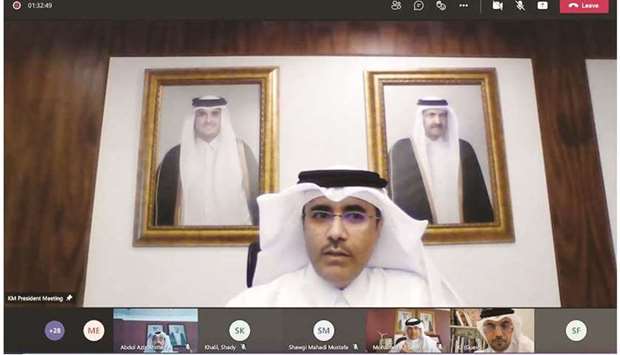The National Programme for Conservation and Energy Efficiency (Tarsheed) of the Qatar General Electricity and Water Corporation (Kahramaa) helped the country save about QR300mn in 2020 by reducing energy consumption by 289 gigawatt-hours (GWh) and water by 32mn cum.
Also, Tarsheed succeeded in saving an estimated 3,207mn cu ft of gas and reducing 0.4mn tonne of carbon emission, as highlighted yesterday by Kahramaa at an online press conference in the presence of president Essa bin Hilal al-Kuwari and Tarsheed president Abdulaziz al-Hammadi.
Al-Kuwari recalled that Tarsheed was established in line with diversification of energy sources and adoption of sustainability systems in accordance with the Qatar National Vision 2030 and the Second National Development Strategy 2018-2022. "Tarsheed’s efforts aim to efficiently and effectively manage the vital resources of Qatar,” he noted adding that the efforts continue to spread the culture and methods of energy efficiency. A number of important initiatives were implemented in 2020. These include the application of regulations and standards for the use of resources in various sectors and the initiative for energy efficiency standards for air-conditioners in addition to the introduction of the first project in Qatar for a photovoltaic station with a system energy storage for charging electric cars. The initiative to reduce electricity and water consumption in the residential sector by 5% was recently launched.
Al-Hammadi noted that Tarsheed has accomplished technical and awareness initiatives and implemented many innovative solutions and projects. These include a number of infrastructure models for electric vehicle charging stations, including the first photovoltaic station project with the energy storage system in Qatar.
“There is a programme in co-operation with the Ministry of Transport and Communications to launch the first electric passenger bus and its charging stations and to establish the strategic infrastructure for the charging stations in the country in a bid to encourage the use of environmentally friendly means of transport and contribute to a significant reduction in carbon emissions,” he said.
Tarsheed's most recent initiative to reduce electricity and water consumption in the residential sector by 5% is closely related to the sustainability goals of Qatar and the 17 global strategic goals in accordance with the Paris Agreement signed by Qatar to reduce its carbon emission and combat climate change.
Al-Hammadi urged all sections of the society to co-operate in order to achieve desired results through the initiative.
ends...
Also, Tarsheed succeeded in saving an estimated 3,207mn cu ft of gas and reducing 0.4mn tonne of carbon emission, as highlighted yesterday by Kahramaa at an online press conference in the presence of president Essa bin Hilal al-Kuwari and Tarsheed president Abdulaziz al-Hammadi.
Al-Kuwari recalled that Tarsheed was established in line with diversification of energy sources and adoption of sustainability systems in accordance with the Qatar National Vision 2030 and the Second National Development Strategy 2018-2022. "Tarsheed’s efforts aim to efficiently and effectively manage the vital resources of Qatar,” he noted adding that the efforts continue to spread the culture and methods of energy efficiency. A number of important initiatives were implemented in 2020. These include the application of regulations and standards for the use of resources in various sectors and the initiative for energy efficiency standards for air-conditioners in addition to the introduction of the first project in Qatar for a photovoltaic station with a system energy storage for charging electric cars. The initiative to reduce electricity and water consumption in the residential sector by 5% was recently launched.
Al-Hammadi noted that Tarsheed has accomplished technical and awareness initiatives and implemented many innovative solutions and projects. These include a number of infrastructure models for electric vehicle charging stations, including the first photovoltaic station project with the energy storage system in Qatar.
“There is a programme in co-operation with the Ministry of Transport and Communications to launch the first electric passenger bus and its charging stations and to establish the strategic infrastructure for the charging stations in the country in a bid to encourage the use of environmentally friendly means of transport and contribute to a significant reduction in carbon emissions,” he said.
Tarsheed's most recent initiative to reduce electricity and water consumption in the residential sector by 5% is closely related to the sustainability goals of Qatar and the 17 global strategic goals in accordance with the Paris Agreement signed by Qatar to reduce its carbon emission and combat climate change.
Al-Hammadi urged all sections of the society to co-operate in order to achieve desired results through the initiative.
ends...


